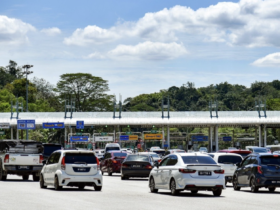PUTRAJAYA, July 31– Malaysia’s ageing trend continues, with 12 states now categorised as ageing, according to the Current Population Estimates Malaysia 2025 released by the Department of Statistics Malaysia (DOSM) today.
Chief Statistician Datuk Seri Dr Mohd Uzir Mahidin said a state is considered to have reached ageing status when individuals aged 65 and above comprise more than seven per cent of its total population.
Melaka has reached an ageing population rate of 7.3 per cent, while both Pahang and the Federal Territory of Kuala Lumpur recorded 7.1 per cent each, he said.
“Perak remains as the leading state with the highest percentage of elderly population at 10.3 per cent,” he said in a statement here today.
He also said that five states outpaced the national growth rate of 0.5 per cent, namely Terengganu at 1.2 per cent, Kelantan (one per cent), and Pahang, Selangor and Melaka each at 0.6 per cent.
“The three states with the highest population percentage in 2025 are Selangor with 21.6 per cent, followed by Johor (12.3 per cent and Sabah (11 per cent). On the opposite end, the Federal Territories of Labuan and Putrajaya recorded the lowest population percentage at 0.3 per cent and 0.4 per cent respectively,” he added.
Mohd Uzir said Malaysia’s total population in 2025 is estimated at 34.2 million as compared to 34.1 million in 2024 with a growth rate of 0.5 per cent.
He said the population of citizens increased from 30.7 million in 2024 to 30.9 million in 2025 with the growth rate lowering from 0.7 per cent to 0.6 per cent, and in contrast, the non-citizen population recorded a sharp decline in growth from 13.6 per cent in 2024 to -0.5 per cent last year.
He said the percentage of the population aged 65 years and over increased from 7.6 per cent to eight per cent over the same period, while the young age group aged 0–14 years declined from 22.2 per cent to 21.6 per cent.
Meanwhile, the working-age group aged 15–64 years increased slightly from 70.2 per cent to 70.4 per cent, while the median age also increased to 31.3 years, up from 30.9 years in the previous year.
“The composition of citizens in 2025 increased to 90.1 per cent from 90 per cent in 2024. Meanwhile, non-citizens decreased from 10 per cent to 9.9 per cent over the same period.
“Bumiputera accounted for 70.5 per cent out of 30.9 million citizens in 2025 from 70.3 per cent in 2024. Nevertheless, the composition of the Chinese decreased to 22.2 per cent from 22.4 per cent the previous year, while Indians and others remained at 6.5 per cent and 0.8 per cent respectively,” he said.
Mohd Uzir said the male population stood at 18 million in 2025, outnumbering females at 16.3 million with an overall sex ratio of 110 males for every 100 females.
“Overall, all states in Malaysia recorded more males than females, except for Perlis (99) and Putrajaya (97). States with sex ratio exceeding the national average of 110 include Kuala Lumpur (117), Johor (116), Selangor (114), Pahang (114) and Melaka (112),” he said.
He said Putrajaya recorded the highest composition of population aged 0-14 years in 2025 at 33.3 per cent, while Kuala Lumpur recorded the highest share of working age population aged 15-64 years with 76.1 per cent.
Mohd Uzir said Malaysia’s population density increased slightly to 104 persons per square kilometre (sq km) in 2025 from 103 in 2024, with the most densely populated in Kuala Lumpur at 8,546 persons per sq km while the least densely populated at Sarawak (20 persons), followed by Pahang (46 persons) and Sabah (51 persons).
He said based on the projection for 2020-2060, Malaysia’s population is projected to reach its peak of 42.38 million in 2059 before gradually declining to 42.37 million in 2060, 42.08 million in 2065, and 41.43 million in 2070.
— BERNAMA






















Leave a Reply